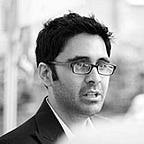How Autocracy Rises
What Institutional Failure Really Means
In this day and age, when we’re bitterly divided, it’s natural to ascribe the rise of autocracy to a failing of the left, or the right. Unfortunately, that way lies little insight, only blame, which, while it might be satisfying, illuminates little. Autocracy — wherever we see it, and whenever we see it — is a result of institutional failures, and, like an implosion, autocracy turns those failures into collapses.
Failures to do what, precisely? Let me illustrate, using the example of America. First let us ask: how many institutions had to fail for autocracy to rise? Just one, two, or three?
Well, first, most of the media had to reject warnings from scholars of leadership and politics, going so far as to pooh-pooh, minimize, and thus delegitimize such warnings. The other kind of news, cable news, too, spent election year not just dismissing warnings of autocracy, but for example, in Joe Scarborough’s case, actively supporting the autocrats they would later wax outraged at on Twitter and oppose, never once the whole while examining, why, perhaps, they had made such an historic mistake to begin with, nor paying any kind of price for having made that mistake. Failure upon failure, perhaps best exemplified by Jimmy Fallon, in the notorious pic above.
But news media are just barely the beginning. Then there was the intervention into the election by a government agency, that irrevocably altered its outcome. There was the stunning failure of the Democrats, the only real opposition party, to craft a working opposition platform, message, or manifesto at all. And then of course there was technology. LOL — Twitter barely suspended an account, even if that account belong to a genuine card carrying Nazi. Facebook gleefully spread propaganda for pennies. And so on.
But even all that was only the beginning. There was the failure of intellectuals and pundits — nearly every single major one — from Nate Silver to Ezra Klein and so on, not just to “predict”, but even to allow the possibility that autocracy was a very real outcome, perhaps a probability, in a divided nation with a stagnant economy that barely hid a long, bitter history of hate. Nearly every single one. I cannot recall one single mainstream pundit or intellectual who foretold the story that was obviously likely to follow from America’s failed economy, society, and culture — apart from, say Sarah Kendzior, who is dismissed by major media entirely, perhaps because she tells the truth all too well.
To tell the truth all too well. Perhaps that is the truest crime of all. Because the human mind needs its myths and its illusions and its dreams. Its myths of greatness and nobility and potency. It is those myths that not just unite human beings in this shared project we call society — but that defines and shapes this social allowance that we call sanity. What could have been more insane, then, to say that autocracy was going to rise, when according to consensus, things had never been better? Ah, but that is precisely the point. Institutions of course create consensus. But should that consensus grow too divorced from reality, then the result will be revolution, or implosion, or perhaps both, one inside the other.
How did we see autocracy rise in America? We vent and complain bitterly today that it has, but we still do not understand the stakes — and especially not the scale and scope. Nearly every single major kind of institution had to fail for autocracy to rise. That much is always true, and America is no exception. To fail at what? At it’s job. Intellectuals to think. Media to inform. Social media to connect. Oppositions to oppose. Pundits to predict. Judiciary to judge. And so on. When all these kinds of institutions, democratic, political, media, social, fail, then, of course what is really happening is that democracy, polity, society, and truth itself are no longer coming into being.
The job of institutions, properly understood, is to safeguard something that does not exist at all: human possibility itself. It is a hard job, often a thankless job, this business of shielding the unborn from the unworthy. And yet it is in that truest way that institutions can be said to fail. When they surrender human possibility itself to those who would destroy, ruin, or ensnare it, whether they enact that surrender by omission or commission, whether through negligence or malfeasance, then they can be judged, rightly, to have failed at their truest task, their authentic responsibility, not just to society, which is an abstraction, but to the possibility in you and I, in our children, and in the future. These do not exist yet. But they are not abstractions. They are lived realities, love and truth and beauty and defiance and grace, waiting to be born.
Institutions hold human possibility. And yet. When institutions fail at holding our possibility then there is the truest void of all: not just an absence, but an absence of absence. A nonexistent thing itself fails to exist. That is the purest void of all, isn’t it? And so in that void left behind, autocracy, like a poisoned tree growing in the darkness, takes root. And yet the autocrat is only the tree. He is not the night that has fallen across the promised land.
Umair
October 2017
